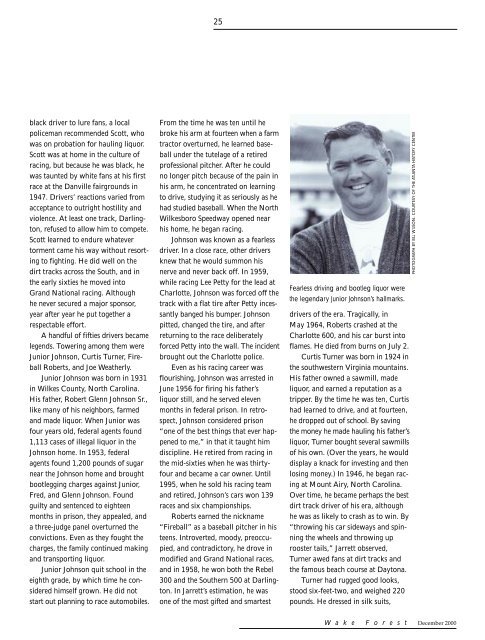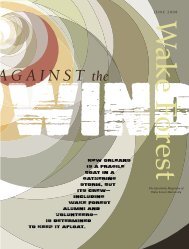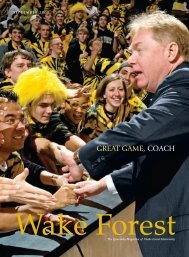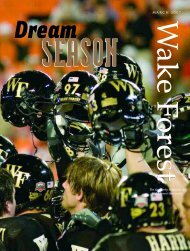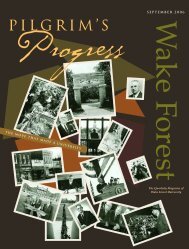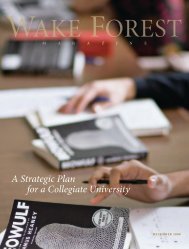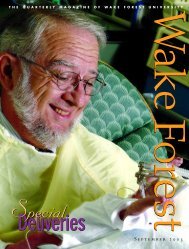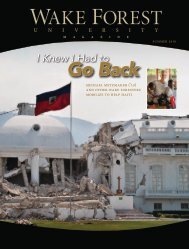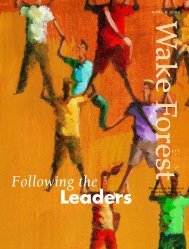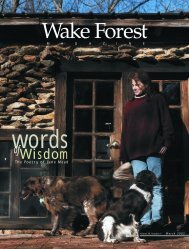Wake Forest Magazine December 2000 - Past Issues - Wake Forest ...
Wake Forest Magazine December 2000 - Past Issues - Wake Forest ...
Wake Forest Magazine December 2000 - Past Issues - Wake Forest ...
- No tags were found...
Create successful ePaper yourself
Turn your PDF publications into a flip-book with our unique Google optimized e-Paper software.
25<br />
black driver to lure fans, a local<br />
policeman recommended Scott, who<br />
was on probation for hauling liquor.<br />
Scott was at home in the culture of<br />
racing, but because he was black, he<br />
was taunted by white fans at his first<br />
race at the Danville fairgrounds in<br />
1947. Drivers’ reactions varied from<br />
acceptance to outright hostility and<br />
violence. At least one track, Darlington,<br />
refused to allow him to compete.<br />
Scott learned to endure whatever<br />
torment came his way without resorting<br />
to fighting. He did well on the<br />
dirt tracks across the South, and in<br />
the early sixties he moved into<br />
Grand National racing. Although<br />
he never secured a major sponsor,<br />
year after year he put together a<br />
respectable effort.<br />
A handful of fifties drivers became<br />
legends. Towering among them were<br />
Junior Johnson, Curtis Turner, Fireball<br />
Roberts, and Joe Weatherly.<br />
Junior Johnson was born in 1931<br />
in Wilkes County, North Carolina.<br />
His father, Robert Glenn Johnson Sr.,<br />
like many of his neighbors, farmed<br />
and made liquor. When Junior was<br />
four years old, federal agents found<br />
1,113 cases of illegal liquor in the<br />
Johnson home. In 1953, federal<br />
agents found 1,200 pounds of sugar<br />
near the Johnson home and brought<br />
bootlegging charges against Junior,<br />
Fred, and Glenn Johnson. Found<br />
guilty and sentenced to eighteen<br />
months in prison, they appealed, and<br />
a three-judge panel overturned the<br />
convictions. Even as they fought the<br />
charges, the family continued making<br />
and transporting liquor.<br />
Junior Johnson quit school in the<br />
eighth grade, by which time he considered<br />
himself grown. He did not<br />
start out planning to race automobiles.<br />
From the time he was ten until he<br />
broke his arm at fourteen when a farm<br />
tractor overturned, he learned baseball<br />
under the tutelage of a retired<br />
professional pitcher. After he could<br />
no longer pitch because of the pain in<br />
his arm, he concentrated on learning<br />
to drive, studying it as seriously as he<br />
had studied baseball. When the North<br />
Wilkesboro Speedway opened near<br />
his home, he began racing.<br />
Johnson was known as a fearless<br />
driver. In a close race, other drivers<br />
knew that he would summon his<br />
nerve and never back off. In 1959,<br />
while racing Lee Petty for the lead at<br />
Charlotte, Johnson was forced off the<br />
track with a flat tire after Petty incessantly<br />
banged his bumper. Johnson<br />
pitted, changed the tire, and after<br />
returning to the race deliberately<br />
forced Petty into the wall. The incident<br />
brought out the Charlotte police.<br />
Even as his racing career was<br />
flourishing, Johnson was arrested in<br />
June 1956 for firing his father’s<br />
liquor still, and he served eleven<br />
months in federal prison. In retrospect,<br />
Johnson considered prison<br />
“one of the best things that ever happened<br />
to me,” in that it taught him<br />
discipline. He retired from racing in<br />
the mid-sixties when he was thirtyfour<br />
and became a car owner. Until<br />
1995, when he sold his racing team<br />
and retired, Johnson’s cars won 139<br />
races and six championships.<br />
Roberts earned the nickname<br />
“Fireball” as a baseball pitcher in his<br />
teens. Introverted, moody, preoccupied,<br />
and contradictory, he drove in<br />
modified and Grand National races,<br />
and in 1958, he won both the Rebel<br />
300 and the Southern 500 at Darlington.<br />
In Jarrett’s estimation, he was<br />
one of the most gifted and smartest<br />
Fearless driving and bootleg liquor were<br />
the legendary Junior Johnson’s hallmarks.<br />
drivers of the era. Tragically, in<br />
May 1964, Roberts crashed at the<br />
Charlotte 600, and his car burst into<br />
flames. He died from burns on July 2.<br />
Curtis Turner was born in 1924 in<br />
the southwestern Virginia mountains.<br />
His father owned a sawmill, made<br />
liquor, and earned a reputation as a<br />
tripper. By the time he was ten, Curtis<br />
had learned to drive, and at fourteen,<br />
he dropped out of school. By saving<br />
the money he made hauling his father’s<br />
liquor, Turner bought several sawmills<br />
of his own. (Over the years, he would<br />
display a knack for investing and then<br />
losing money.) In 1946, he began racing<br />
at Mount Airy, North Carolina.<br />
Over time, he became perhaps the best<br />
dirt track driver of his era, although<br />
he was as likely to crash as to win. By<br />
“throwing his car sideways and spinning<br />
the wheels and throwing up<br />
rooster tails,” Jarrett observed,<br />
Turner awed fans at dirt tracks and<br />
the famous beach course at Daytona.<br />
Turner had rugged good looks,<br />
stood six-feet-two, and weighed 220<br />
pounds. He dressed in silk suits,<br />
PHOTOGRAPH BY BILL WILSON. COURTESY OF THE ATLANTA HISTORY CENTER<br />
W a k e F o r e s t <strong>December</strong> <strong>2000</strong>


